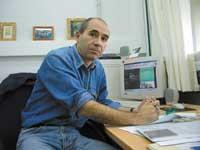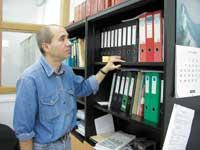Kepa Altonaga: "In classical writers the only layman was the doctor Jean Etxepare"
How did the idea of creating a book about northern doctor Jean Etxepare come about?

It has been different from previous books. Folin was a character I found almost by chance. I knew the name Folin of my professional works; XIX. Malaquologist of the twentieth century, offered data on the snails of Euskal Herria. But, in that sense, I saw at one point that from that data it had other consequences, including the question of Atlantida. And while I was pulling that thread, I was getting a lot of eye-catching things out for an outreach book, and I thought I had to write a book with that.
And when I documented myself, I came across another character named Armand David, who for me was very unknown. And I mentioned it in Foline, no more; I still had no documentation. But when I started using bibliographic sources I realized the importance of David. He was a very interesting character. Besides the information that appeared in the book, I collected another complete folder.
But Etxepare is different. I have known Etxepare for a long time. When you start the world of Basque and read some of the texts of the classics, you realize that they were all cures. By chance, the only layman was Etxepare, as well as a doctor. Therefore, I had another way of thinking and saw everything with other eyes. That is why I have often read the texts of Etxepare. For some time I have had a suggestion: When he was in the hands of the Marquis of Folin and Armand David, he thought that Etxepare also gave it for a book.
Now, when I have taken Etxepare, I have realized that for me it will be the most difficult of the three, it is a doctor, but it is a doctor of a small town. And, in principle, he has made no scientific or wonderful contribution, he has worked in another world. In this sense, we will say that the character is quite gray, and it could be thought that his interest comes only from literature and the world of letters, but it is not so.
So, what about scientific disclosure?

Disclosure yes, but all Etxepare articles that may be informative are about health. And that's not exactly my closest area. That is why this informative aspect was not my pleasure to begin with.
I see three types of disclosure: the last-minute, the utilitarian disclosure (to transmit hygienic, sanitary, etc.) and that of diletante (simply, intellectually attractive subjects). Etxepare did mostly the second.
Unlike the Marquis of Folin and Armand David, with Etxepare if you work the character there is danger of not making a very natural book. And if they touch on several topics I have in mind, Etxepare himself may be eclipsed in the book; in that sense I have a concern.
When writing books, you rely on a character, and with the excuse of it you add other topics. Why choose this structure?
I have some models that I like and I want to approach them in my writings. Those models have not been invented by me, of course. The book of the Marquis of Folin presents a fairly rigid and monolithic structure comparatively, with four related but rather closed sections. Armand David's book, along the way of writers David Quammen and Stephen Jay Gould, begins at one point knowing where I want to go, but on the way I put many explanations.
This makes it difficult to classify the book in terms of gender, but when doing so it is much more enjoyable. So, for example, I enjoy more when I search for fonts. And on the other hand, when you read anything, you always want to use some interesting material that you find. You need an excuse to explain some things.
Buletina
Bidali zure helbide elektronikoa eta jaso asteroko buletina zure sarrera-ontzian











